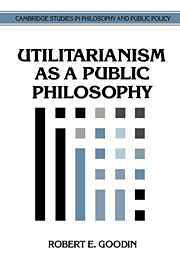4 - Government house utilitarianism
Published online by Cambridge University Press: 28 January 2010
Summary
Critics of utilitarianism invite us to contemplate alternatives to utilitarianism. When doing so, however, we ought also to consider alternatives within utilitarianism. Not all utilitarianisms are of a cloth, and some of the criticisms that might be devastating against one variant might not stick against another. Depending upon what, precisely, it is that bothers us about utilitarianism, utilitarianism itself might provide an answer.
The ordinary way of denominating varieties of utilitarianism, surveyed in Chapter 1, differentiates them according to what the felicific calculus is to be used to choose. Thus, act-utilitarianism has us choosing actions, one by one, according to the calculus of pleasures and pains. Rule-utilitarianism has us choosing a rule of conduct that will, insofar as it is followed, maximize utility, and that rule then dictates our choice of actions. Motive utilitarianism has the utility calculus being used to select motives and dispositions according to their general felicific effects, and those motives and dispositions then dictate our choices of actions.
The distinction I shall here propose works along a dimension orthogonal to that one. Instead of differentiating utilitarianisms on the basis of what they are used to choose, I suggest doing so on the basis of who is supposed to use the utilitarian calculus to make choices. Implicitly, contemporary discussions of varieties of utilitarianism are all standardly addressed, first and foremost, to individuals acting in their personal capacities and making choices which, while they may affect others as well, principally affect the choosers' own lives.
- Type
- Chapter
- Information
- Utilitarianism as a Public Philosophy , pp. 60 - 78Publisher: Cambridge University PressPrint publication year: 1995
- 1
- Cited by



